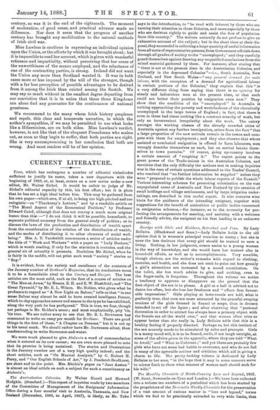The Australasian Colonies. By Walter Hazel! and Howard Hodgkin. (Stanford.)—This
report of inquiries made by two members of the Committee of Management of the Emigrants' Information Office during a four months' visit to Australia, Tasmania, and New Zealand (December, 1886, to April, 1887), is likely, as Mr. Take says in the introduction, to "be read with interest by those who are taming their attention to these Colonies, and more especially by those who are desirous rightly to guide and assist the flow of population from this country." The writers naturally do not profess to give an exhaustive account of the subject ; but in the short time at their dis- posal, they succeeded in collecting a large quantity of useful information from all sorts of representative persons, from Government officials down through all grades of society to the " unemployed ;" and they carefully guard themselves against drawing any unqualified conclusions from the mixed material gathered by them. For instance, after stating that "there is not at the present time in the Australasian Colonies, and especially in the depressed Colonies "—i.e., South Australia, New Zealand, and New South Wales—" any general demand for male labour, with the exception of a demand for agricultural labour in certain portions of the Colonies," they explain that this "is a very different thing from saying that there is no opening for steady and industrious men at the present time, or that saoh could not better their position by emigration even now." They show that the condition of the "unemployed" in Australia is nothing approaching the poverty and wretchedness of the chronically unemployed in the large towns of England ; in fact, that there is even in these bad times nothing like a constant scarcity of work, but only an inconvenient irregularity about the work. The outcry amongst the working classes of the already crowded cities of Australia against any further immigration, arises from the fact " that a large proportion of the new arrivals remain in the towns and com- pete with them for employment ; and they also observe that where assisted or nominated emigration is offered to farm labourers, men wrongly describe themselves as such, but on arrival betake them- selves to town pursuits." Of course, going up-country involves a certain amount of "roughing it." The report points to the great power of the Trade-unions in the Australian Colonies, and mentions that the only difficulty the authors met in making inquiries was in the case of certain questions addressed to the Trades' Council, who resolved that "no further information be supplied" unless they were "prepared to publish the whole labour reports of the Council." Various interesting schemes for promoting colonisation on the vast unpopulated areas of Australia and New Zealand by the creation of small holdings and village settlements, and by large irrigation under- takings, are described in this useful report. It also contains wise hints for the guidance of the intending emigrant, together with suggestions for the benefit of authorities or public bodies concerned in emigration schemes,—for instance, as to the necessity for per- fecting the arrangements for meeting, and assisting with a welcome and friendly advice, the emigrant on his first landing in an unknown country.






































 Previous page
Previous page